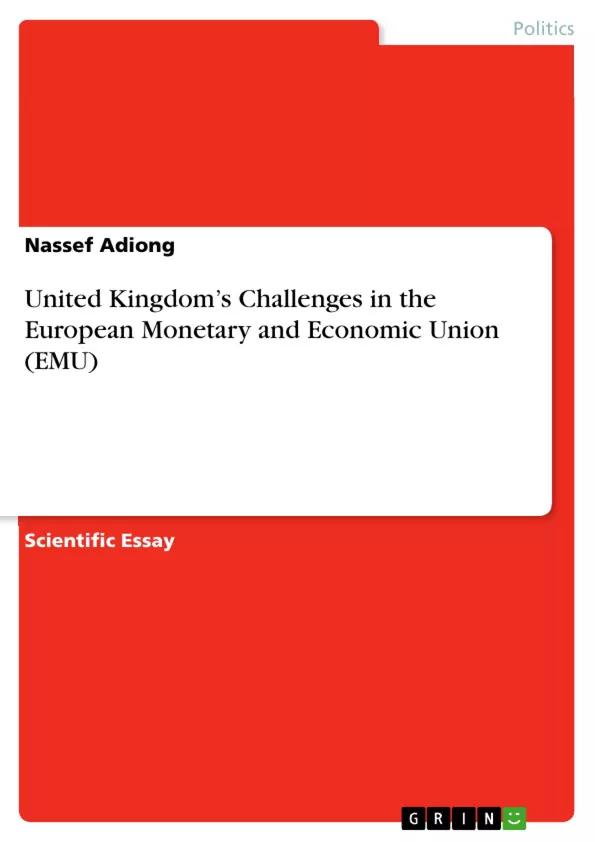This monograph faces the question why the United Kingdom ‘opted out’ of the European Monetary and Economic Union (EMU). Then, an analysis will be drawn in accordance to the advantages and the disadvantages of the EMU for UK’s economic and business environment.
Inhaltsverzeichnis (Table of Contents)
- United Kingdom's Challenges in the European Monetary and Economic Union (EMU)
- Introduction
- Historical Background of the European Monetary System
- Public Opinion in the UK
- Monetary Policy and Fiscal Regime in the EMU
- Economic Interests and the Single Currency
- The Five Economic Tests
- Arguments Against Participation in the EMU
- Higher Interest Rates
- Reduced Inward Investment
- The City of London
Zielsetzung und Themenschwerpunkte (Objectives and Key Themes)
This monograph examines the reasons behind the United Kingdom's decision to opt out of the European Monetary and Economic Union (EMU). It then analyzes the potential advantages and disadvantages of EMU membership for the UK's economic and business environment. The work aims to provide a comprehensive understanding of the complex economic and political factors that influenced the UK's decision and to assess the long-term consequences for the country's economic future.
- The economic and political rationale for the UK's decision to opt out of the EMU
- The potential benefits and drawbacks of EMU membership for the UK's economy
- The impact of EMU on the UK's financial services sector, specifically the City of London
- The role of public opinion and political considerations in the UK's decision-making process
- The implications of the UK's opt-out for its future economic relations with the European Union
Zusammenfassung der Kapitel (Chapter Summaries)
The first chapter delves into the historical context of the European Monetary System (EMS), tracing its origins and its evolution leading up to the establishment of the EMU. The chapter examines the economic challenges faced by European countries in the wake of the Bretton Woods system's collapse and the role of the EMS in minimizing exchange rate fluctuations and promoting trade.
The second chapter explores public opinion in the UK regarding EMU membership. It highlights the widespread skepticism towards giving up the pound sterling and analyzes the political dynamics surrounding the issue, particularly the opposition's use of public fears to gain electoral advantage.
The third chapter focuses on the implications of EMU membership for the UK's monetary policy and fiscal regime. It examines the potential changes in interest rate setting, the role of independent economic boards, and the pressures for fiscal adjustments within the framework of the EMU.
The fourth chapter delves into the UK's economic interests in the single currency, analyzing key economic factors such as output gaps, business cycle convergence, interest rate differentials, and inflation divergence. It also explores the potential consequences of entering the EMU at an inappropriate exchange rate.
The fifth chapter presents the five economic tests established by the UK government as prerequisites for EMU membership. It outlines the criteria for convergence of business cycles, flexibility, investment, financial services, and growth, stability, and jobs. The chapter also discusses the UK Treasury's assessment of these tests and the rationale behind the government's decision to postpone a decision on EMU membership.
The sixth chapter examines arguments against UK participation in the EMU, focusing on concerns about potential negative consequences such as higher interest rates, reduced inward investment, and a diminished role for the City of London as a global financial center.
Schlüsselwörter (Keywords)
The primary keywords and themes explored in this work include the European Monetary and Economic Union (EMU), the European Monetary System (EMS), the pound sterling, the euro, exchange rate stability, interest rate differentials, inflation, economic convergence, inward investment, financial services, the City of London, public opinion, and political considerations.
Frequently Asked Questions
Why did the United Kingdom opt out of the EMU?
The UK's decision was influenced by economic skepticism regarding the pound sterling, concerns over national sovereignty, and political pressure from public opinion.
What are the "Five Economic Tests"?
These were criteria set by the UK government to assess if joining the Euro would benefit the economy, focusing on convergence, flexibility, investment, financial services, and jobs.
How would joining the EMU affect the City of London?
There were concerns that joining might diminish the City's role as a global financial center, although some argued it could also provide better access to European markets.
What are the arguments against UK participation in the Euro?
Main arguments included the risk of higher interest rates, reduced inward investment, and the loss of an independent monetary policy tailored to the UK's specific needs.
What was the historical background of the European Monetary System?
The system evolved after the collapse of the Bretton Woods system to minimize exchange rate fluctuations and promote economic stability across Europe.
- Citation du texte
- Nassef Adiong (Auteur), 2008, United Kingdom’s Challenges in the European Monetary and Economic Union (EMU), Munich, GRIN Verlag, https://www.grin.com/document/160435



